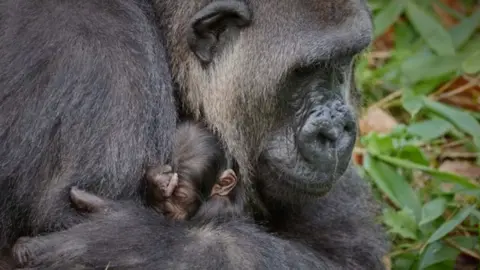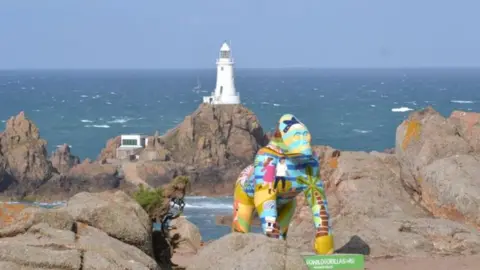Coronavirus: Jersey Zoo faces 'uncertain future'
 Charlie Wyle
Charlie WyleJersey Zoo has said it is facing an "uncertain future" due to the "devastating" effects of coronavirus.
The conservation centre said it had seen an 80% fall in its income since it was forced to close on 24 March.
Despite reopening to members on 12 May, the zoo said a lack of visitors and no summer season had left it in an "extremely precarious position".
Durrell Wildlife Trust, which runs the site, said it would cost £700,000 a month to continue its efforts.
The charity relies on money brought in by visitors and donors to carry out its conservation work, including its care of the zoo's 1,200 animals.
An appeal for donations during the coronavirus pandemic has raised £200,000 so far, the trust said.
Durrell's chief executive Dr Lesley Dickie said: "We cannot simply mothball the zoo and would never compromise the care we give our animals, which are some of the rarest and most endangered species on Earth."

Durrell Wildlife Trust

- Jersey Zoo was opened in 1959 by Gerald Durrell, a British conservationist and author
- The trust operates 50 projects in 18 countries around the world, focusing on islands including those in the Pacific and the Caribbean
- It helps to save endangered species such as the black lion tamarin and the Madagascar side-necked turtle
- Animals at Jersey zoo are part of a breeding programme that aims to release them back into the wild

The zoo has successfully bred gorillas under its care, more recently including the first to be born in Jersey in seven years.
It is also the site where silverback Jambo appeared to "protect" a five-year-old boy after he fell into the gorilla enclosure in 1986.
Dr Dickie said: "Jersey Zoo is very much woven into the island's DNA and has been integral to the community for over 60 years but we urgently need help to ensure that our zoo will still be part of Jersey's future."

- SYMPTOMS: What are they and how to guard against them?
- GLOBAL SPREAD: Tracking the pandemic
- TWO METRES: Could less than 2m work?
- THE R NUMBER: What it means and why it matters
- STRESS: How to look after your mental health

